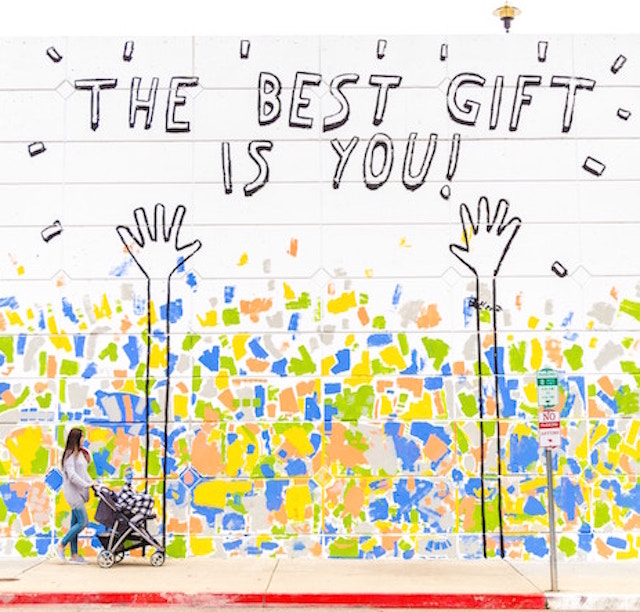
A few months ago, I dropped off my son at daycare for the first time.
He was excited by all the new toys and playmates, while I frantically tried to hold onto my hot tears until I stumbled out the door.
Nothing really prepares us for the shocking separation between a momma and newly independent child. It’s heartbreaking, exhilarating, and traumatic all rolled into one great big pile of sleepless nights, changing roles, and soggy tissues.
I also learned a painful lesson in ownership. My son isn’t mine.
Biologically yes. My body grew his sturdy frame and beautiful eyes. And I most definitely gave birth to him.
By creating prolonged physical space between us for the first time, we both learned (well, I relearned) that we are both functioning individuals on our own. Radical! Often this is shocking for new moms. We know it intellectually, but it’s incredibly easy to let our sense of self be defined by parenthood.
Our language feels so woefully inadequate to describe our deepest bonds—what we say aloud creates the relationships that we live.
Too often, we parents approach parenthood with ownership. My child, my daughter, my son, without ever analyzing the power dynamics, expectations, and relationships we create with our words.
I don’t feel pride in saying my son, I feel pride in being his Momma. This slight shift of perspective can fundamentally change how we approach parenthood and hopefully how our children grow into independent beings.
It’s probably unrealistic and would be a logistical nightmare to do away with using “mine” or “my,” but it’s worth being aware when we use them.
It drove me nuts when I was first married to refer to my love as my husband. It felt awkward and possessive to refer to this incredible person based solely on his relationship to me. Every time I would introduce him, I would try to dispense with the “this is my husband” as quickly as possible and refer to him only by name.
When our son was born just over a year ago, I noticed I did the same thing. It felt strange and unnerving to say “my son” when making the slew of doctors’ appointments that come with having a new baby.
“Hello, I’m calling to make an appointment for the sweet little cuddle bug currently sleeping in the crook of my now asleep arm, uh wait, I’m sorry, I mean my son.”
We navigate society through our relationships, but those relationships should be flexible, expansive, and collaborative.
My husband and I chose to have a child. We chose to bring life into the world and we could not be happier with our choice.
But our son made no choice.
I was fortunate to grow up in two loving homes with four loving parents. But how many of us have parents who demand things from us that we’re not prepared to give?
Parenthood is stewardship. It’s hard. It’s a constant state of am I doing this right? I can’t possibly be doing this right.
For new parents, trust is an especially hard thing to build with others when it comes to taking care of our children.
“Are you sure you know what you’re doing? How safe is that? What are your credentials? How long will it take to run a background check?” And this is just for our little ones’ grandparents.
I had the incredible privilege to stay at home with our son for over a year. It was hard and exhausting and messy and joyful and precious and perfect and wild.
I love his sweet giggle and ears just like his daddy’s, and I love his toddling pitter-patter as he steps into his own. I’m here to witness and guide him, love and protect, and of course learn from him.
But I don’t own my son.
As a toddler, he’s already his own person, and I have the great privilege of being his Momma. This doesn’t mean that I love him any less. It means I love him more.
My own mom litters my birthday cards with “I’m so proud to be your Momma.” There was never any doubt how much she loved me, and it’s a freeing sort of love. The kind that is given with no strings attached.
As parents we spend our days fretting over healthy meals, safe places to play, adequate diaper (or as we call it in our home, nappy) changes, and the general well-being of our babies. We yearn with all our heart to give them the best of the best. To love them more completely than any child was loved before.
As we move into this new normal where someone else becomes his primary caregiver during the day, it sometimes feels like I’m cutting off an arm or a leg—or more like scooping out my heart with a melon baller.
But I’m also excited. And guilty that I feel a certain amount of liberation.
I recently wrote an article about being a feminist stay-at-home mom. Now, I’ve re-joined the working world and taken on another hat.
And I’m terrified.
One hand is reaching up to add this new hat to my head—maybe a stellar felted cloche hat in teal—while the other hand is frantically trying to defend my head from any hats trying to usurp my snug, warm, softly knitted “mom” hat—of course in a sensible color impervious to stains.
This working hat is dusty. Maybe even a little moldy. I’m worried that I’ve outgrown it, or maybe I’m more worried that it will fit perfectly and I’ll want to wear it more than my soul-defining “mom” hat.
But despite the new and the changing and the unknown, I love being a momma. Not just any mother, but my son’s Momma.
By becoming aware of the words we use to describe our most fundamental and transformative relationships, especially those between a child and a parent, we can learn and grow. And what is parenthood if not growth?
I won’t do away with saying “my son,” but I’m going to choose to slow down more and look up through his eyes, rather than only looking down from my own.
Note: We use the gendered noun “son,” because our language and society makes it ostracizing not to do so. But really it’s because I am afraid of being too radical or too outside the norm. And I’m willing to learn how to do better.
We break gender stereotypes in other ways, but we’re not ready to create a completely non-binary life for our son. What we are prepared to do is allow our beloved child to decide for himself who he chooses to be as he grows. If that means choosing gender pronouns other than “he” and “him,” I will be delighted to comply.
~
Author: Kenni Linden
Image: Dakota Corbin/Unsplash
Copy Editor: Callie Rushton


 Share on bsky
Share on bsky




Read 0 comments and reply